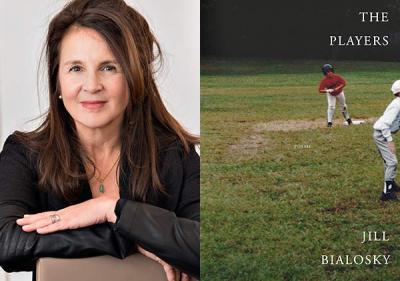The American Scene

“The Players”
Jill Bialosky
Knopf, $26
Jill Bialosky’s “The Players” captures the essence of Americana in her baseball poems, in her descriptions of the beach, nature, small-town life, motherhood, and parents. Her true subject is the inevitability of loss, which includes children growing up and leaving, the death of a parent.
The introductory poem, “The Lucky Ones,” involves the theme of the much loved son maturing, “ours, the boy of late youth, / of our happiness and our struggles, the boy who made us whole / and broken, was in his room perhaps dreaming / of a girl and sleeping the long, tangled sleep of a teenager.” Nature and its dark underside is introduced through the image of a garter snake, “a comet of danger, serpent of the water” they watch as they sit on the beach.
The son’s maturation is followed up in the long poem “Manhood” that makes up the first section, held together by the masculine American pursuit of baseball. The poem’s point of view, ranging from the players, the mothers, the fathers, girls who were “played,” and the spectators, covers the gamut of the game, a stand-in for emerging male aggression and a rite of passage from boyhood to manhood. The nuances of the game and the boys’ development are shown. Its ultimate reward when “your eye caught hers / and your body exploded into bliss.” Baseball is a symbol for the needs and concerns of all of these groups, all of whom are players even if they are not on the field.
Other American scenes are evoked through landscape, as in “American Comedy,” where “They are tearing up fields where horses graze / for designer mansions,” while the speaker misses “wildflowers, horse dung, and clover.” In these poems the dark side of American life emerges subtly as varied characters who inhabit Ms. Bialosky’s milieu are presented. In “Sonnet for the Misbegotten” there are surfers “in black diving penguin suits,” anorexics “speed-walking the beach,” and a scene at a barbecue. What could be more American? The two ironic titles quietly convey Ms. Bialosky’s critique of the dramatis personae as well as their vulnerability. In “American Pastoral,” for example, “One of us joined a support group / or is leaving the marriage.”
Having wondered many times who owns the flip-flops and shoes left by beachgoers I have to say my favorite poem in this section was “Ode.” I love the way Ms. Bialosky places this seemingly humorous poem in a literary context, tradition being the first hint the poem has a deeper meaning. She goes directly to her omnipresent theme, loss. “Somebody stole my yellow flip-flops.” She speculates, “I guess they needed them more than me,” and tells us, “I bought them / at Kmart for ten ninety-nine.” Her overreaction to this theft — “It makes / me sad. The lack of humanity. The / guts. The betrayal” — is intentionally laughable. Yet underneath the comic surface lies the outrage at losses, large and small.
And the larger losses appear in poems in the section called “The Players,” having to do with what happens after a loved one dies when there is the packing up of documents and household possessions: birth and death certificates, the divorce decree, scrapbooks with corsages and ballet programs. “The Guardians,” an apt title for the poem, suggests that those who were once guarded by the dead are now their guardians.
I was particularly drawn to “April Mornings,” a takeoff on Robert Hayden’s “Sunday Mornings,” one of my all-time favorite poems. In Ms. Bialosky’s version it is the mother, rather than the father, who gets up. However, instead of a caring parent, we read of “the dull and sad / pennies of her eyes, / body limp as a fevered / child’s” and “the awful creak / of the iron mail chute” opening before “the knife slit open / the envelopes / of debts unpaid.”
There are many enjoyable poems in this book, with descriptions of creatures such as sand crabs, gulls, and sandpipers, as well as the ocean, a solid tree, a bird’s nest.
She deftly merges the world of birds with the way marriage evolves from first tenderness in “Marriage Nests,” which has the two powerful last lines “I hear him get up, the sound of heavy footsteps. / Birds call. A cry deeper than hurt or love.”
The three poems about literature, in a section slyly titled “Interlude,” cite novels that educate us, such as “The House of Mirth” and “A Tale of Two Cities,” and describe a visit to Jane Austen’s haunts in Bath and the influence of “The Portrait of a Lady.” These poems serve as a counterpoint to the family life in the poems that surround them, a commentary on how reading also forms us.
Most poignant and true are poems about a son who has turned into an adolescent, especially “Perspective,” with its lovely lyrical refrain, “For two days it was cold and it rained.” Its conclusion has the mother remembering the family that was: “Look, that was once us / sailing down the small / sand hill to the beach / with you in our arms.”
The speaker’s inner thoughts, while she observes the ocean, the beach, the sea animals, reveal the essence of her feelings about the anguish of mothers who “must watch their children / thrive and suffer,” in short, life’s impermanence. Through close observation of her world, Ms. Bialosky conveys both the ordinariness and the extraordinariness of life.
Jill Bialosky’s books include “History of a Suicide: My Sister’s Unfinished Life,” a memoir, and “Intruder,” a collection of poems. An editor at W.W. Norton, she lives in New York and Bridgehampton.
Carole Stone’s most recent poetry collections are “Hurt, the Shadow” and “American Rhapsody.” She lives part time in Springs.
